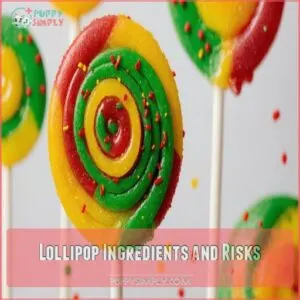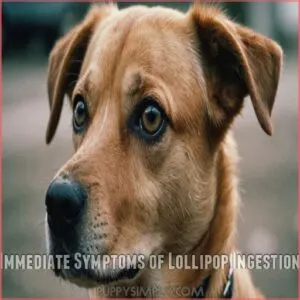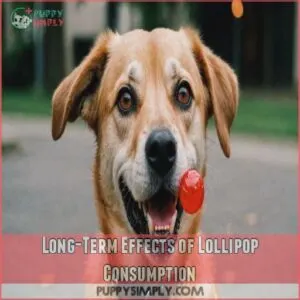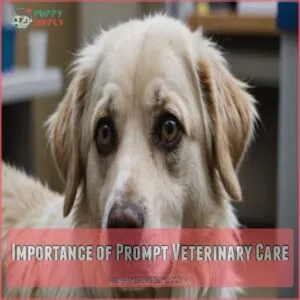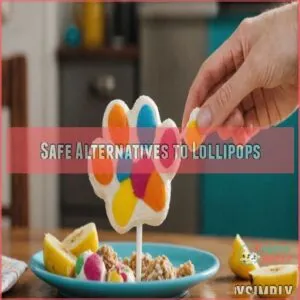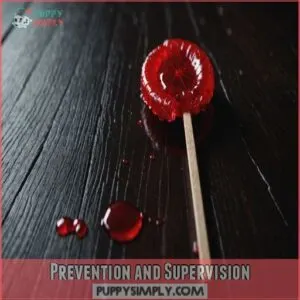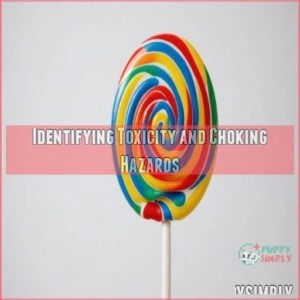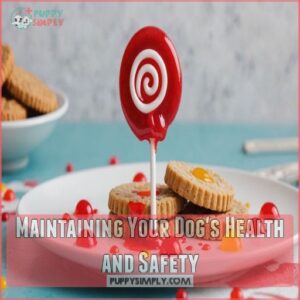This site is supported by our readers. We may earn a commission, at no cost to you, if you purchase through links.
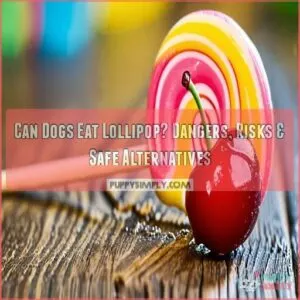 Sure, it might sound cute to hand over a lollipop to your pooch, but can dogs eat lollipop safely? Not really. These sugary treats pose several risks. Lollipops can become a choking hazard, thanks to those delightfully dangerous sticks. If that’s not enough, ingredients like artificial colors and flavors can upset Fido’s tummy. Watch out for xylitol—it’s toxic to dogs, potentially causing serious health issues.
Sure, it might sound cute to hand over a lollipop to your pooch, but can dogs eat lollipop safely? Not really. These sugary treats pose several risks. Lollipops can become a choking hazard, thanks to those delightfully dangerous sticks. If that’s not enough, ingredients like artificial colors and flavors can upset Fido’s tummy. Watch out for xylitol—it’s toxic to dogs, potentially causing serious health issues.
Instead, consider safer, dog-friendly alternatives like frozen pup pops or crunchy carrots. Keep those paws on the ground and lollipops out of reach, and discover a range of healthier treats that won’t stick around.
Table Of Contents
- Key Takeaways
- Lollipop Ingredients and Risks
- Dangers of Lollipop Ingestion
- Safe Alternatives to Lollipops
- Prevention and Supervision
- Identifying Toxicity and Choking Hazards
- Veterinary Care and Emergency Response
- Maintaining Your Dog’s Health and Safety
- Frequently Asked Questions (FAQs)
- Can dogs eat lollipops?
- Can dogs eat xylitol?
- Can dogs eat chocolate?
- Can dogs eat popcorn?
- Can dogs eat fruit?
- Can dogs eat chewing gum?
- Are lollipops ok for dogs?
- Can I let my dog lick a lollipop?
- What can dogs eat candy?
- Can I give my dog a lolly?
- Are sugar-free lollipops safer for dogs?
- Can lollipops cause long-term health effects in dogs?
- How do artificial flavors affect dogs?
- What should I do if my dog begs for candy?
- Do lollipops attract ants harmful to dogs?
- Conclusion
Key Takeaways
- Don’t feed lollipops to your dog; they’re loaded with sugar and artificial colors that can lead to obesity, dental issues, and health risks.
- Be cautious of xylitol in lollipops; this sweetener is highly toxic to dogs and can cause severe health problems like hypoglycemia and liver damage.
- Lollipop sticks pose choking hazards and can cause bowel obstructions. Keep these dangers in mind and store lollipops out of reach.
- Opt for safer, dog-friendly treats like frozen pup pops or natural snacks, such as low-sugar options like dried fruit snacks, which can provide essential vitamins, minerals, and fiber, and align better with your dog’s health and safety.
Lollipop Ingredients and Risks
Let’s face it, lollipops are delicious, but they’re packed with ingredients that aren’t so great for your furry friend.
We’ll explore the sugary sweetness, artificial colors, and potential dangers lurking within those colorful treats, so you can keep your dog safe and happy.
Sugar Content and Its Effects
Imagine your pup munching on a lollipop.
Sure, it seems harmless, but sugar rushes into canine nutrition with dental problems, weight gain, and a diabetes risk hot on its heels.
Energy levels spike like a sugar high, leading to long-term effects.
So, keep sugar intake for dogs low—after all, nobody wants their dog on a perpetual sugar rollercoaster!
Artificial Colors and Flavors
Artificial colors and flavors in lollipops can stir up quite the mix of dog allergies and food sensitivities.
While these colorful additives make treats pop, they’re not dog-friendly.
Here’s why you should watch out:
- Color additives can trigger allergies.
- Peanut butter alternatives, like fruits and vegetables, can be safer options, while certain flavorings, such as those containing xylitol toxicity risks, may affect dog health.
- Toxic ingredients pose pet poisoning threats.
- Consider natural alternatives for safer treats.
Xylitol Toxicity and Its Symptoms
Curiosity might take your dog to places it shouldn’t, like a lollipop containing xylitol.
This sweetener spells trouble for Fido, causing hypoglycemia, liver damage, and other scary signs of xylitol poisoning.
Within thirty minutes, you’d notice weakness or even seizures.
Rush to emergency vet care if that happens.
To keep tails wagging, stick to xylitol-free alternatives in dog treats.
Choking Hazards From Lollipop Sticks
Lollipop sticks, deceptively harmless as they seem, pose serious risks for your furry friend.
When Fido gets curious:
- Choking: The stick can block their airway.
- Bowel Obstruction: It might end up causing digestive trouble.
- Dog Emergency: Prompt veterinary care is needed if swallowed.
Dog safety means steering clear of lollipop sticks!
Dangers of Lollipop Ingestion
Feeding your dog a lollipop might seem harmless, but it can actually cause immediate health issues like vomiting or diarrhea—plus, nobody wants to explain that mess at the dog park!
Over time, sugar-laden treats can lead to serious problems like obesity and diabetes, making a trip to the vet not just advisable but necessary.
Immediate Symptoms of Lollipop Ingestion
Ever wondered what happens when your dog snags a lollipop?
Expect symptoms like vomiting, diarrhea, or a stomach upset, signaling a potential dog emergency.
Watch for panting and lethargy, hinting at xylitol toxicity or a choking hazard.
Here’s a quick look at what might happen:
| Symptom | Possible Cause |
|---|---|
| Vomiting | Stomach Upset |
| Diarrhea | Bowel Obstruction |
| Lethargy | Xylitol Toxicity |
| Panting | Choking Hazard |
Long-Term Effects of Lollipop Consumption
Beyond the immediate dangers, repeated lollipop consumption puts your dog at risk.
Think of it as a slow-motion disaster movie: consistent high sugar intake increases obesity risk, potentially leading to diabetes.
Dental issues are a sure bet, and even liver damage is a possibility.
Frequent vomiting or diarrhea caused by eating lollipops may lead to dehydration, emphasizing the importance of dog food for diarrhea
Importance of Prompt Veterinary Care
When your dog gets into a sweet mess with a lollipop, quick action is essential.
Prompt veterinary care can prevent serious issues, like choking hazards or xylitol poisoning.
Trust your gut—when in doubt, head to the vet.
- Watch for vomiting or signs of distress.
- Prevent access to xylitol-containing products.
- Be proactive; dogproof your home to avoid surprises.
Safe Alternatives to Lollipops
When considering treats for your dog, remember that lollipops contain toxic artificial sweeteners like xylitol. When you’re looking for a safer treat than lollipops for your dog, try offering frozen pup pops, or consider using natural ingredients like bananas and yogurt for a homemade delight.
For a fun twist, swap the lollipop stick for something dog-friendly like carrots, celery, or a trusty dog biscuit.
Frozen Pup Pops as a Healthy Treat
When it comes to doggie delights, frozen pup pops reign supreme.
They’re a fun, chilly alternative to sugary lollipops, offering health and happiness without the risk of a choking hazard.
Imagine your furry friend enjoying a homemade frozen treat—made simply with safe fruits like bananas or a dollop of yogurt.
Keep their sugar intake low and their tails wagging!
Natural Ingredients and Pet-Friendly Treats
Why not swap that lollipop for pet-friendly treats packed with natural ingredients?
Homemade dog treats are an excellent alternative to store-bought biscuits that may contain toxic ingredients like xylitol, like those using safe fruits and vegetables, make excellent healthy dog snacks.
Think wholesome options free from artificial flavors and colors.
They’re not just yummy but also a great way to keep your furry friend wagging happily while dodging the sugar buzz of commercial dog food.
Carrots, Celery, and Dog Biscuits as Stick Alternatives
Looking for dog-safe stick alternatives? Carrots, celery, and dog biscuits are perfect, offering healthy alternatives that prevent choking hazards.
Unlike a lollipop stick, these treats are nutritious and satisfying.
With these options, you won’t worry about sugar intake for dogs.
Plus, they’re a fun way to keep your pup happy without resorting to lollipop ingredients.
Try making dog-friendly alternatives like cakes without xylitol, and then bake some homemade dog treats for extra love!
Prevention and Supervision
You’ve probably noticed how your dog’s curious nose can sniff out treats faster than a detective on a case, so keeping lollipops out of reach is your first line of defense.
By teaching basic commands and monitoring your dog’s actions, you can prevent any sneaky paws from nabbing forbidden snacks.
Keeping Lollipops Out of Reach
Proactive prevention is key to lollipop-related mishaps.
Seriously, those sugary treats are trouble for your furry friend!
Consider investing in dog safe storage solutions for your home.
Keep lollipops out of reach by:
- Storing them high up in cupboards.
- Using childproof containers.
- Never leaving them unattended, especially around curious pups.
Monitoring Your Dog’s Curiosity
Consider your dog’s curiosity a ticking clock that keeps you on your toes.
By dog-proofing your home and identifying curiosity triggers, you can steer them clear of lollipops and other sugary dangers.
Encourage safe playtime to distract them from risky snacks.
Keeping an eye on their antics will protect your dog’s safety, avoiding the trouble of toxic foods.
Teaching Basic Commands to Prevent Food Grabbing
Teaching your dog basic commands like "Leave it" or "Drop it" is very important to prevent sneaky food grabbing that can lead to a sugar rush from a lollipop.
Using positive reinforcement techniques, such as those found in a dog training basic commands video, can help you master these commands.
Imagine your pooch eyeing your snack; with commands like "Wait" and "Stay," you can dodge
Identifying Toxicity and Choking Hazards
As a dog owner, it’s essential to recognize the signs of toxicity and choking hazards that lollipops can present to your furry friends.
While the colorful candy might look tempting, ingredients like xylitol can be extremely harmful, and the stick itself can pose significant risks.
Recognizing Xylitol Toxicity Symptoms
You’ve puppy-proofed the kitchen, but what if Sparky sneaks a sugarfree lollipop?
Xylitol, lurking in certain candies, is a deadly sweetener danger for dogs.
Watch for vomiting, seizures, or stumbling, as they could signal xylitol poisoning.
Hypoglycemia might develop as quick as lightning.
Call your vet pronto if you suspect your pup’s had a sweet encounter with toxic foods for dogs.
Identifying Choking Hazards From Lollipop Sticks
After recognizing xylitol troubles, let’s chat about those sneaky lollipop sticks.
Size and stick material can make them risky toys for your curious pup, especially if your dog’s chewing habits rival that of a beaver.
Different dog breeds and ages face varying choking hazards, leading to potential gastrointestinal irritation.
Make sure candy wrappers are hidden and keep those sticks away!
Assessing The Situation and Your Dog’s Health
Got a curious pooch who’s snagged a lollipop?
It’s not just the stick that’s worrisome; you’ve got to think about toxicity too.
If your dog’s munching on xylitol-containing products, immediate action is key.
Check for lollipop symptoms like dizziness or stumbling.
Don’t hesitate—reach out for vet advice before sugar intake for dogs turns into a bigger problem.
Veterinary Care and Emergency Response
Don’t panic if your pup sneaks a lollipop – knowing what to do is key!
Contact your vet immediately if you suspect your dog’s eaten a lollipop, especially if it contains xylitol or they’re showing signs of distress; they can advise on the best course of action.
Contacting Your Veterinarian for Guidance
If you notice signs of trouble like stumbling or vomiting, especially from potential xylitol ingestion, it’s time to ring your vet.
Their advice is like a lifeline in these situations, offering guidance on next steps.
Even if the risks seem minimal, the vet’s expertise guarantees your furry friend avoids any health mishaps.
Remember, a quick call beats a long ER visit!
Inducing Vomiting and Administering Activated Charcoal
A dog’s sweet tooth might lead to trouble, especially with lollipops.
If you suspect your dog has ingested candy, especially a product from a website selling dog candy poison, timing is key in emergencies, and knowing when to induce vomiting can save the day.
Activated charcoal benefits those moments by preventing further absorption of toxins.
Always rely on vet guidance for safe outcomes.
Remember, not all remedies suit sugarfree products like xylitol-laced sweets.
Following Your Veterinarian’s Instructions
Taking advice from your vet when your dog nibbles a lollipop can be your best move.
This is especially important if your dog has undergone certain medical procedures, such as spaying or neutering which can lead to weight gain and other health issues.
Here’s how you can follow their instructions effectively:
- Stick to the medication dosage they recommend.
- Explore treatment
Maintaining Your Dog’s Health and Safety
To keep your dog healthy and safe, it’s important to limit their sugar consumption and be aware of artificial colors and flavors in their treats.
Choosing the right snacks will help their well-being, but also make sure they’re not sneaking sugary surprises when you’re not looking!
Limiting Sugar Consumption
While a lollipop might seem harmless, keeping your dog’s sugar intake in check is key for their health.
Too much sugar can lead to dog diabetes, dental health issues, and weight management troubles.
Choose healthy treats and sugar substitutes instead.
| Health Issue | Potential Problem |
|---|---|
| Dog Diabetes | Sugar intake |
| Dental Health | Cavities |
| Weight Management | Obesity |
| Dog Candy Safety | Choking hazard |
| Nutrition | Imbalanced diet |
Being Aware of Artificial Colors and Flavors
After cutting down on sugar, the next worry on the list is those vibrant artificial colors and flavors in lollipops.
They might look fun, but these artificial dyes can trigger dog allergies, making it essential to explore healthier snack options like natural dog treats alternatives.
Opt for natural alternatives and keep an eye on color concerns to boost your dog’s candy safety.
Choosing The Right Treats for Your Dog
So, you’ve learned about the dangers of artificial colors and flavors.
Now, let’s talk dog-safe treats!
Choose snacks with natural ingredients for the best nutritional value.
Think of it as dogproofing your pantry.
Moderation is key; too many treats, even healthy ones, aren’t good.
Plenty of healthy alternatives exist—carrot sticks are a fun option!
Remember, always check the ingredients before giving your pup anything new.
Happy snacking!
Frequently Asked Questions (FAQs)
Can dogs eat lollipops?
Dogs should avoid lollipops; they’re sweet for a reason.
Sugar can harm their health, causing obesity and dental issues.
Plus, the stick’s a choking hazard.
Keep those sugary treats out of paw’s reach, and try safer alternatives.
Can dogs eat xylitol?
Imagine xylitol as a wolf in sheep’s clothing for dogs: seemingly harmless but truly dangerous.
It’s extremely toxic and can cause hypoglycemia, liver failure, or worse.
If your dog ingests xylitol, seek immediate veterinary help.
Can dogs eat chocolate?
Chocolate isn’t safe for dogs because it contains theobromine, which they can’t metabolize well.
Even small amounts can be toxic, leading to vomiting, diarrhea, or more serious problems.
Keep chocolate treats far from your furry friend.
Can dogs eat popcorn?
Popcorn’s a tricky treat for dogs.
Plain, air-popped popcorn is okay in small amounts, but skip the butter, salt, and other flavors.
They can cause health issues.
So, keep movie night snacks mostly human-friendly to stay safe.
Can dogs eat fruit?
Yes, but with caution!
Many fruits are fine, but some are toxic.
Always check which fruits are safe for dogs before sharing.
A little apple or banana is okay, but moderation is key.
Avoid grapes and raisins!
Can dogs eat chewing gum?
Chewing gum and dogs don’t mix.
Xylitol, an artificial sweetener in many gums, is toxic and can cause hypoglycemia, seizures, or even liver failure.
Always keep gum out of reach and seek vet help if ingested.
Are lollipops ok for dogs?
Giving lollipops to dogs isn’t a good idea.
They contain sugar and artificial ingredients that can harm your dog’s health, causing obesity, dental issues, and other problems.
Plus, the stick is a choking hazard.
Stick to dog-safe treats!
Can I let my dog lick a lollipop?
Letting your dog lick a lollipop is like tempting fate.
The sugar and artificial ingredients can harm their health, leading to obesity and dental problems.
It’s best to stick with dog-safe treats that won’t cause issues.
What can dogs eat candy?
Dogs shouldn’t eat candy, as it often contains xylitol like mint candy for pets, sugar, or artificial ingredients that can harm them.
Stick to dog-safe treats like carrots or specially-formulated dog snacks.
Your furry friend will appreciate these healthier options!
Can I give my dog a lolly?
You shouldn’t give your dog a lolly.
Lollipops can cause dental issues, obesity, and potential choking hazards.
They may contain xylitol, a harmful sweetener for dogs.
Stick to dog-friendly treats for safe and happy snacking!
Are sugar-free lollipops safer for dogs?
When it rains, it pours, and sugar-free lollipops might seem safer, but they can still pose threats.
Xylitol, a common sweetener, is toxic to dogs.
Always keep both regular and sugar-free lollipops out of reach.
Can lollipops cause long-term health effects in dogs?
Yes, repeated lollipop consumption can lead to obesity, diabetes, and dental woes. Those sugary treats aren’t your pup’s best friend! Stick to dog-friendly snacks; it’s safer for their health.
How do artificial flavors affect dogs?
Artificial flavors can prompt tummy troubles and trigger allergies in dogs.
Even in tiny doses, these flavors might muddle digestion or cause skin irritations.
Stick to natural treats for your pooch, keeping them content and comfy.
What should I do if my dog begs for candy?
Think twice about that sweet temptation, as dogs don’t do well with candy’s sugar and artificial ingredients.
Instead, offer a safe, dog-friendly treat like a small carrot or specially made pet biscuit to satisfy their cravings.
Do lollipops attract ants harmful to dogs?
Lollipops can attract ants, which aren’t inherently dangerous to dogs but can cause distress if they crawl on their skin or fur.
Keep sugary treats away to prevent unwanted little guests and keep your pup comfy.
Conclusion
Just like you wouldn’t feed candy to a toddler, keep lollipops away from your dog.
These sugary treats, packed with hazards from sticks to xylitol, aren’t worth the risk.
Instead of wondering "can dogs eat lollipops," focus on safer alternatives like frozen pup pops or crunchy veggies.
If your dog sneaks one, know the signs and act fast.
With supervision and tasty dog-friendly treats, you’ll keep your furry friend happy and healthy.

